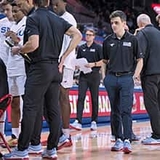Coming Back After Concussion: Max’s Story
Coming Back After Concussion: Max’s Story
Game days have changed for Max since he was sidelined by a concussion playing soccer his sophomore year in high school. Today, the resilient 19-year-old’s love of sports is as strong as ever – thanks to the excellent care he received at Children’s Hospital of Philadelphia (CHOP).

A hustling sophomore at Southern Methodist University in Dallas, Texas, Max is head manager of the men’s Division 1 “Mustangs” basketball team – a role historically reserved for a senior. But instead of racking up points, assists and rebounds on the court, Max’s focus is on the needs of the team.
“It’s my happy place,” says Max, a sports management major who holds a 3.2 GPA while working 60 hours a week with the team.
Both Max and his mother, Lisa, attribute his recovery from a life-altering concussion back in October 2016 – his second sports-related concussion in five years – to Christina L. Master, MD, FAAP, CAQSM, FACSM, a pediatrician and sports medicine specialist at CHOP. Master is the only pediatric sports medicine specialist in the region with subspecialty certification in brain injury medicine and is the clinical co-leader of the Minds Matter Concussion Program at CHOP along with Kristy B. Arbogast, PhD, a biomedical engineer.
Max’s family credits Master for recognizing a binocular vision problem (sometimes called “teaming”) in his right eye and recommending visio-vestibular therapy to help his eyes relearn how to work together, correctly and comfortably.
CHOP research device helps diagnose concussion
Six years after his unforgettable injury, Max’s memories are precise. The Shipley School’s junior varsity team was ahead with four minutes left on the clock when Max collided with a much larger opponent. His head smashed into the other boy’s chest, knocking Max to the ground.
Surrounded by his trainer and coaches, Max recalls, “I was lying on my back and couldn’t see or walk at first. I definitely had the wind knocked out me. I went home and got in bed.”
Head Impact Sensor Study
Max happened to be wearing a special headband as part of a research study Drs. Arbogast and Master were conducting with Shipley to measure the head acceleration teens experience when engaged in athletic activity, so the concussion was obvious. Miniature sensors registered two blows to Max’s head.
The next day, Dr. Arbogast reviewed the game video, and Dr. Master and an assistant coach met Max at school to review Max’s baseline tests results conducted before the season. Every student participating in the study, primarily those who played soccer, basketball and lacrosse, were evaluated at the beginning and end of each season with objective measures of balance, eye tracking and pupillometry, among other tests.
For six months after his injury, Max avoided all screen time – TV, computer and his cell phone – before slowly reintroducing it. Dr. Master encouraged Max to walk around, but his mom says it was difficult for Max, who was experiencing headaches, low energy and zero appetite.
“I only wanted yellow Gatorade and white bread,” recalls Max.
“I would make bacon, steak and lamb chops and he would stare at the table,” Lisa says. “I was worried about Gatorade and bread being his only nutrition, but [Dr. Master] told me it was OK. His body seemed to be craving glucose.”
Lisa had full confidence in Dr. Master’s ability to treat her son. She’d heard the doctor speak about the concussion protocol at Shipley just two months prior to Max’s injury – plus she’d had some personal experience with concussion, based on Max’s prior head injury in fifth grade.
Concussion Symptoms
The signs and symptoms of a concussion often appear in the first few hours after injury, but in most cases gradually improve within days or weeks. However, Max’s case was more complex, prolonging his recovery.
“[Dr. Master] knew almost right away he had a binocular vision issue,” Lisa says.
A successful concussion treatment plan
Based on Dr. Master’s extensive clinical experience and research, she quickly suspected Max fell into a category of kids with concussion-related vision disorders who may have had pre-existing – yet undiagnosed – binocular vision disorders that were exacerbated by concussion.
Dr. Master recommended vestibular and vision rehabilitation for Max, which he received at CHOP’s Specialty Care Center in King of Prussia and from a developmental optometrist near to his Gladwyne home. At the time, CHOP did not provide vision rehabilitation, but the Minds Matter Concussion Program has expanded in recent years and children can now receive vision rehabilitation through occupational therapy at CHOP’s Philadelphia campus.
Max attended rehabilitation sessions twice weekly, and though the process was slow and frustrating, the sessions were successful. Gradually, he was able to return to school and by January he had resumed a full course-load. His appetite returned and nightmares subsided.
“One thing I really loved about [Dr. Master] was that she talked a lot about the psychological burden on athletes after concussion … and she supported us by listening to me and to Max,” Lisa said. “When your doctor is at the top of their game – treating 1,000 other kids – for her to stop and listen was such a gift.”
Newfound passions

At first, it was hard for Max to step back from playing contact sports. But his parents decided, and he eventually agreed, the risk of a third concussion was not worth it. Instead, he refocused his love of sports into a new passion: sports videography.
He does still dribble the ball around with his team and shoots the occasional basket, but his competitive playing days are behind him. Max still experiences vision issues from time to time and wears glasses to read, but overall, he feels his life is on the right path.
“I’m loving life,” Max says.